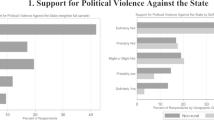Abstract
The article contextualises the Big Society in the context of neo-liberal thought about the character of society and arguments about the state as the political form of a free economy. It argues that Big Society is first and foremost a critique of the existing social relations. The contrasting term of the Big Society is therefore the small society. It argues further that Big Society amounts to an eminently political practice of government. It contends that the strong state is the political form of the Big Society.
Similar content being viewed by others
Notes
Byrne et al (2014) make a similar critique.
Ancil (2012) certainly thinks so, and rightly so. Röpke is a founding thinker of the German ordoliberal tradition, which is seen to have provided the blueprint for the West-German social market economy. See also Norman (2010, p. 178) and Joseph (1975). Bonefeld (2013a) examines the social policy dimension of German neo-liberalism.
The point about the ungovernable welfare state expresses the neo-liberal diagnosis of the failure of so-called Keynesianism in a nutshell. See, for example, King (1976).
Bulley and Sokhi-Bulley (2012) characterise this society as a non-responsible society, one that is unable of self-government. This is a society of the rioting kind (p. 465), entirely unpacified.
This conception of the relationship between political state and depoliticised society is key to Weber’s definition of the state as the monopoly holder of the legitimate use of violence. On the means and ends of the political state in a free labour economy, see Bonefeld (2006).
Bernard Baruch who was a leading Democrat, argued with similar contempt about the welfare seeking poor in his critique of Roosevelt’s New Deal arguing that ‘the crowd has seized the seat of government and is trying to seize the wealth. Respect for law and order has gone’ (quoted in Schlesinger, 1957, p. 202).
On the social constitution of a free labour economy, see Bonefeld (2011).
I have not found a reference to soup-kitchens and food banks in the Big Society literature, which is surprising since these social institutions that recognize depravation in the purpose of their civic association have sprung up across the United Kingdom in great numbers as the government’s big society response to the financial crisis, which refinanced the banks and took money out the pocket of the workers ostensibly in order to balance the budgets but in reality to cheapen labour for enterprise (see Dowling and Harvie, 2014).
On Smith’s conception of social class and political form, see Bonefeld (2013b).
On this, see also the exchange between Bulley and Sokhi-Bulley (2012) and Byrne et al (2014).
Workers live by wages, not capital or land. Wage earners depend on an employment contract that pays a living wage by the owners of capital or land. For an exposition see Clarke (1992).
Brittan and his co-author Riley (1980, p. 1) had earlier argued that the windfall of North Sea Oil revenues should be directed by government to establish the foundations of popular capitalism by creating a marketable capital account for every citizen. Such a policy they opined would ‘take a giant stride towards a genuine people’s capitalism’. On this, see White (2009). See Rogers (2014) for an account of ‘capitalist alternatives’ to capitalism.
Different social characters do however experience this freedom and the way in which the coinage is produced differently. As Marx (1973, pp. 156–57) put, ‘the power which each individual exercises over the activity of others or over social wealth exists in him as the owner of exchange value, of money. The individual carries his social power, as well as his bond with society, in his pocket’.
Oscar Wilde captured the sentiments of the caritas of the responsible brotherhood of the Big Society well when he wrote in The Importance of Being Earnest: ‘if the lower orders don't set us a good example, what on earth is the use of them? They seem, as a class, to have absolutely no sense of moral responsibility’.
I use ‘change’ in reference to Holloway (2002).
I use the phrase ‘planning’ here in reference to Hayek’s (1944, p. 31) dictum that the liberal state is a ‘planner for competition’.
On this, see also Byrne et al (2014).
On the moral restraints on competition, see Smith (1976b).
References
Ancil, R.E. (2012) Röpke and the restauration of property: The proletarianized market, in The Imaginative Conservative, http://www.theimaginativeconservative.org/2012/10/roepke-proletarianized-market, accessed 14 August 2013.
Böhm, F. (1973) Die Kampfansage an Ordnungstheorie und Ordnungspolitik. Zu einem Aufstaz im Kyklos. Ordo 24: 11–48.
Bonefeld, W. (1995) The politics of debt. Common Sense (17): 69–91.
Bonefeld, W. (2006) Democracy and dictatorship: Means and ends of the state. Critique 34 (3): 237–252.
Bonefeld, W. (2011) Primitive accumulation and capitalist accumulation. Science & Society 75 (3): 379–99.
Bonefeld, W. (2013a) Human economy and social policy. History of the Human Sciences 26 (2): 106–125.
Bonefeld, W. (2013b) Adam Smith and ordoliberalism. Review of International Studies 26 (2): 106–125.
Brittan, S. (1984) The politics and economics of privatisation. Political Quarterly 55 (2): 109–128.
Brittan, S. and Riley, B. (1980) A People’s Stake in North Sea Oil, Unservile State Papers, No. 26. London: Liberal Party Publication Department.
Bulley, D. and Sokhi-Bulley, B. (2012) Big society as big government. British Journal of Politics and International Relations 16 (3): 452–470.
Byrne, C., Kerr, P. and Foster, E. (2014) What kind of “big government” is the big society? British Journal of Politics and International Relations 16 (3): 471–478.
Clarke, S. (1992) Marx, Marginalism and Modern Sociology. London: Palgrave.
Daily, Telegraph (2011) Is Cameron able to rescue the Big Society? February 7th.
Dowling, E. and Harvie, D. (2014) State, crisis and (big) society. Sociology 48 (5): 869–886.
Eucken, W. (1948/1989) What kind of economic and social system? In: A. Peacock and H. Willgerod (eds.) German Neo-Liberals and the Social Market Economy. London: Palgrave Macmillan.
Eucken, W. (1951) This Unsuccessful Age. London: Hodge.
Ferrero, G. (1963) The Reconstruction of Europe: Talleyrand and the Congress of Vienna, 1814–1815. New York: Norton.
Foucault, M. (1991) Governmentality. In: G. Burchell, C. Gordon and P. Miller (eds.) The Foucault Effect: Studies in Governmentality. Chicago, IL: University of Chicago Press, pp. 87–104.
Foucault, M. (1997) Ethics: Subjectivity and Truth. London: Penguin.
Foucault, M. (2008) The Birth of Biopolitics. London: Palgrave Macmillan.
Green, H.H. (2002) Ideologies of Conservatism. Oxford: Oxford University Press.
Hall, S. (2011) The March of the Neoliberals. The Guardian: G2, 13 September.
Hayek, F. (1944) The Road to Serfdom. London: Routledge.
Hickson, K. (2009) Conservatism and the poor. British Politics 4 (3): 341–362.
Hodkinson, S. and Robbins, G. (2013) The return of class war conservatism. Critical Social Policy 33 (1): 57–77.
Holloway, J. (2002) Change the World without Taking Power. London: Pluto.
Joseph, K. (1975) Freedom and Order. London: Centre for Policy Studies.
Joseph, K. and Sumption, J. (1979) Equality. London: John Murray.
Karicemen, E. (2014) Interlinkages between credit, debt and labour market, Cambridge Journal of Economics, http://cje.oxfordjournals.org/content/early/2014/05/14/cje.beu016.short, accessed 7 September 2014, doi:10.1093/cje/beu016.
King, A. (ed.) (1976) The problem of overload. Why is Britain Harder to Govern. London: BBC Books.
Lakin, M. (2013) The ideology of the coalition: More muscular than liberal? British Politics 8 (4): 476–490.
Letwin, O. (2002) For labour there is no such thing as society, only the state. In: G. Streeter (ed.) There is Such a Thing as Society. London: Politicos.
Marx, K. (1973) Grundrisse. London: Penguin.
Müller-Armack, A. (1978) The social market economy as an economic and social order. Review of Social Economy 36 (3): 325–331.
Nicholls, A. (1994) Freedom with Responsibility. Oxford: Oxford University Press.
Norman (2010) The Big Society. London: University of Buckingham Press.
Oakeshott, M. (1962) Rationalism in Politics and Other Essays. Indianapolis, IN: Liberty Fund.
Quinn, D. (1998) Introduction’ to W. Röpke, A Human Economy, 3rd ed., Wilmingto, DE: ISI Books, pp. iii-xx.
Redwood, J. (1988) Popular Capitalism. London: Routledge.
Röpke, W. (1942) International Economic Disintegration. London: Hodge.
Röpke, W. (1950a) Ist die Deutsche Wirtschaftspolitik richtig? Stuttgart, Germany: Kohlhammer.
Röpke, W. (1950b) Maß und Mitte. Zuerich, Switzerland: Rentsch.
Röpke, W. (1957) Welfare, Freedom and Inflation. London: Pall Mall Press.
Röpke, W. (1964) Wort und Wirkung. Ludwigsburg: Hoch.
Röpke, W. (1998) A Human Economy, 3rd edn. Wilmington, DE: ISI Books.
Röpke, W. (2002) The Moral Foundation of Civil Society. New Brunswick, Canada: Transaction.
Röpke, W. (2009) The Social Crisis of Our Time. New Brunswick, Canada: Transaction.
Rogers, C. (2014) Capitalism and its Alternatives. London: Zed Books.
Rüstow, A. (ed.) (1932/1963) Die staatspolitischenVorraussetzngen des wirtschaftspolitischen Liberalismus. Rede und Antwort. Ludwigsburg, Germany: Hoch.
Rüstow, A. (2005) Freiheit und Herrschaft. Münster, Germany: LIT.
Rüstow, A. (2009) Die Religion der Marktwirtschaf. Berlin, Germany: Walter Eucken Archiv.
Schlesinger, A. (1957) The Age of Roosevelt. Boston, MA: Houghton Mifflin.
Schumacher, E.F. (1993) Small is Beautiful. London: Vintage.
Smith, A. (1976a) The Wealth of Nations. Oxford: Oxford University Press.
Smith, A. (1976b) The Theory of Moral Sentiments. Oxford: Oxford University Press.
Streeter, G. (2002) There is Such a Thing as Society. London: Politicos.
Vanberg, V. (2014) Ordnungspolitik, The freiburg school and the reason of rules, Diskussionspapiere zur Ordnungsökonomie, no. 1, http://www.eucken.de/fileadmin/bilder/Dokumente/DP2014/Diskussionspapier_1401.pdf, accessed 7 September 2014.
White, S. (2009) ‘Revolutionary Liberalism’? The philosophy and politics of ownership in the post-war liberal party. British Politics 4 (2): 164–87.
Willetts, D. (1995) Civic Conservatism. London: Social Market Foundation.
Acknowledgements
Particular thanks are due to Emma Dowling, David Harvie, Steven Kettell and Chris Rogers. I am indebted to the external referees who provided most constructive criticism.
Author information
Authors and Affiliations
Additional information
An earlier draft of this article was read as a workshop presentation at the Conference of the Centre for Research in Socio-Cultural Change, Manchester, September 2014. I am grateful to the participants for the many insightful comments that helped to shape the article.
Rights and permissions
About this article
Cite this article
Bonefeld, W. Big society and political state. Br Polit 10, 413–428 (2015). https://doi.org/10.1057/bp.2015.14
Published:
Issue Date:
DOI: https://doi.org/10.1057/bp.2015.14



